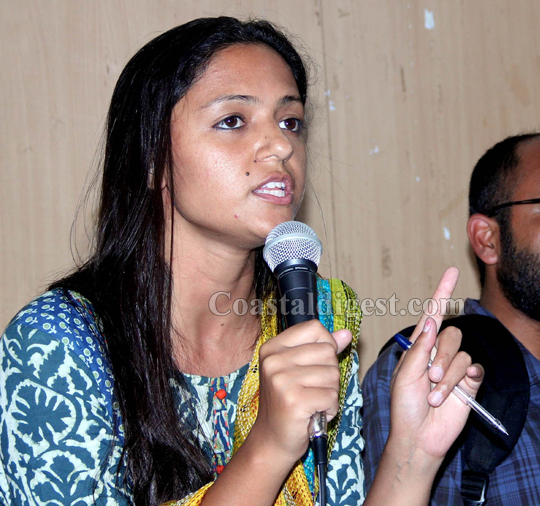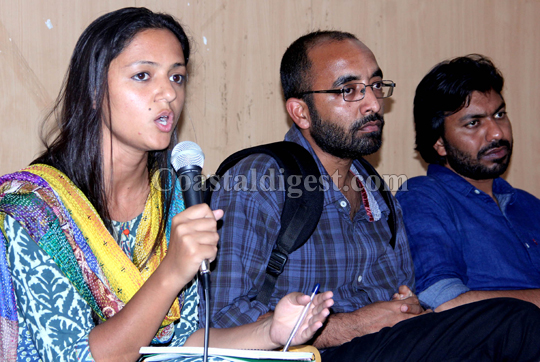Bengaluru: Mar 12: Who is responsible for the death of brave soldiers like Lance Naik Hanmanthappa, asked Shehla Rashid Shora, vice-president, JNU Students Union, who was in the City on?Friday.
 “Soldiers think they are dying for the country but they are actually dying for politicians. Border disputes are kept alive. Politicians and bureaucrats talk to each other in top hotels. All this is a farce,” Shehla, who was here on an invitation from the Journalists' Study Centre, Karnataka, said.
“Soldiers think they are dying for the country but they are actually dying for politicians. Border disputes are kept alive. Politicians and bureaucrats talk to each other in top hotels. All this is a farce,” Shehla, who was here on an invitation from the Journalists' Study Centre, Karnataka, said.
Shehla became the first Kashmiri to win the JNU elections that were held last year. An engineering graduate, she has also done a short course on “India-Women Leadership” from the Indian Institute of Management, Bangalore. She now studies at the Centre for the Study of Law and Governance, JNU.
Even as JNU?president Kanhaiya Kumar stoked fresh controversy with his comments about the army raping women in Kashmir, Shehla reiterated that JNUSU supported soldiers.
The argument, she however said, was much more than that. “We are with the soldiers and any pro-soldier approach is anti-war. However, we need to rethink a number of issues such as the way the arms trade is being conducted and the defence budget is being reduced,” she said, implying that this endangered soldiers' lives. At the same time, JNUSU does not shy away from raising slogans against long-standing issues involving the army such as the Armed Forces Special Powers Act (AFSPA) and custodial rapes, she added.
Shehla, who affiliates herself with the Communist Party of India (Marxist–Leninist) Liberation, said she did have political aspirations, but for the moment there were “broader challenges”. “We contest elections and many of our members have been contesting elections from Bihar. At the moment, we are about saving the ideals of the Constitution. This government has been anti-dalit, anti-women and anti-poor. It is trying to wipe out any opposition as evident even in the FTII,” she said.
While everyone was busy hounding students from the JNU for their “anti-national” slogans, Akbar Chaudhry, another student leader highlighted the part played by JNU students in a number of recent movements. “During the Nirbhaya protests, we were at the forefront. At the Occupy UGC (University Grants Commission)' movement, we protested for 100 days. Even during the Rohith Vemula's incident, we were on a hunger strike,” he said.





 Welcoming the move Dr Arathi Krishna told coastaldigst.com that Indians stranded in any foreign country can utilize this facility. "Initially, I was approached by Mr Zakaria and Mr Sheik who wanted chartered flights to help their employees fly back to India. I asked them to write to the Indian Ambassador in Saudi Araia Mr Ausaf Sayeed. Then I requested the ambassador to forward the request to Joint Secretary Dr Nagendra Prasad, who is in charge of gulf division in the Ministry of External Affairs, and then to Secretary on charge of Gulf and then I requested Secretary of Economic Relations Mr T S Tirumurti who was also in charge of Gulf to follow this up," she said.
Welcoming the move Dr Arathi Krishna told coastaldigst.com that Indians stranded in any foreign country can utilize this facility. "Initially, I was approached by Mr Zakaria and Mr Sheik who wanted chartered flights to help their employees fly back to India. I asked them to write to the Indian Ambassador in Saudi Araia Mr Ausaf Sayeed. Then I requested the ambassador to forward the request to Joint Secretary Dr Nagendra Prasad, who is in charge of gulf division in the Ministry of External Affairs, and then to Secretary on charge of Gulf and then I requested Secretary of Economic Relations Mr T S Tirumurti who was also in charge of Gulf to follow this up," she said.
Comments
Just Ms. Shehla is connected with CPM, she cannot be criticized. Khaunhein Bangalore, you cannot issue diktats to this lady as she is free person.
If you have guts, you should have attended her press briefing and countered her, instead writing in this forum.
for what u have joined jnu do that first, u need not to worry about soldier, if u have that much guts join army and study their situation and protest, u dont know anything and your khaunhain(khanhaiya)
You are 100% correct. No doubt at all.
Add new comment